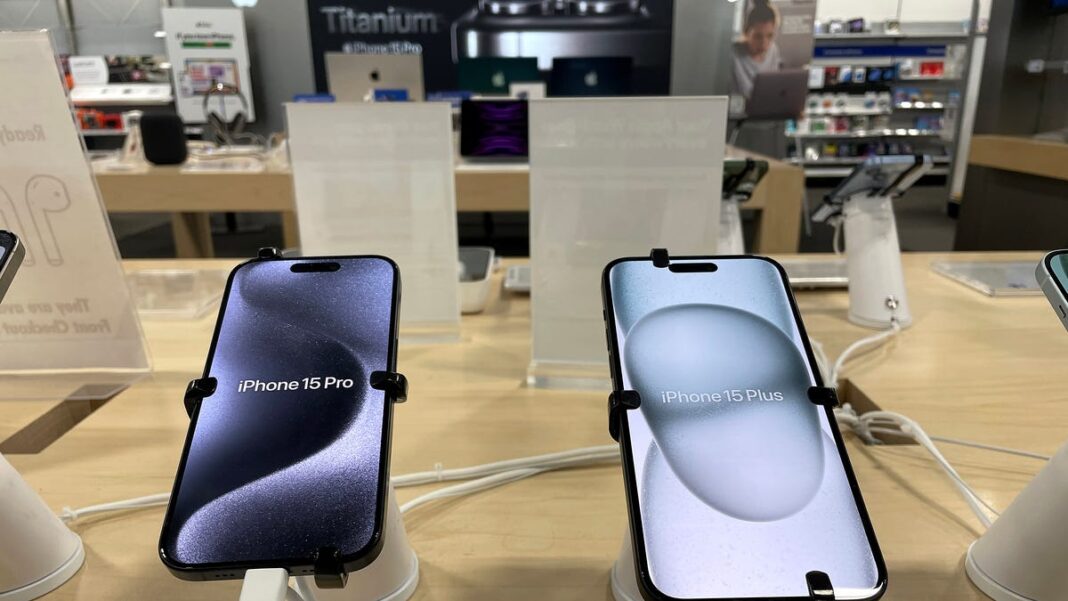In the high-stakes battle over the future of mobile gaming, tech giant Apple is refusing to back down. A US judge’s order to revamp the App Store’s payment system has been met with fierce resistance, as Apple argues that the ruling threatens the very foundation of its digital empire. The lawsuit, brought by Fortnite creator Epic Games, has sparked a heated debate over the balance of power between tech companies and the creators who rely on their platforms. As the two sides engage in a war of words, the fate of the App Store hangs in the balance.
Apple’s App Store Monopoly

Apple’s dominance in the smartphone market has been a subject of scrutiny for years. The company’s market share has consistently hovered around 65%, with prices ranging from $500 to $1,600 for its flagship devices. According to the Justice Department, Apple’s restrictive practices have allowed the company to extract more money from consumers, software developers, publishers, and merchants.

DOJ Sues Apple for Alleged Monopolization
The Justice Department sued Apple Inc. on Thursday for allegedly monopolizing the smartphone market. The lawsuit, joined by 16 state and district attorneys general, alleges that Apple restricted developers of apps, products, and services used on the iPhone that could otherwise lower costs for users.
“We allege that Apple has consolidated its monopoly power not by making its own products better − but by making other products worse,” said Attorney General Merrick Garland. “Consumers should not have to pay higher prices because companies violate the antitrust laws.”
Apple issued a statement saying the lawsuit threatens the company’s ability to provide innovative technology and could set a “dangerous precedent.” “This lawsuit threatens who we are and the principles that set Apple products apart in fiercely competitive markets,” the statement said. “If successful, it would hinder our ability to create the kind of technology people expect from Apple − where hardware, software, and services intersect. It would also set a dangerous precedent, empowering government to take a heavy hand in designing people’s technology. We believe this lawsuit is wrong on the facts and the law, and we will vigorously defend against it.”
Apple Lawsuit Part of Legacy of Standard Oil, AT&T, and Microsoft
Federal officials said the lawsuit follows in the legacy of challenges to the monopolies of Standard Oil, AT&T, and Microsoft. “The remedy paved the way for Apple to launch iTunes, the iPod, and eventually the iPhone free from anticompetitive restrictions, excessive fees, and retaliation,” said Jonathan Kanter, assistant attorney general for the antitrust division.
“We have focused on a pattern of conduct that goes back over a decade that Apple has engaged in, in order to reinforce its monopoly power by excluding rivals, by excluding technologies, and by stifling innovations that would threaten Apple’s stranglehold on its monopoly power,” Kanter added.
The Epic Games Lawsuit
Epic Games, the creator of Fortnite, has been at the forefront of challenging Apple’s restrictive App Store policies. In 2020, Epic Games sued Apple claiming the tech giant has “unreasonable restraints” over how it handles in-app payments.
Apple’s Restrictive App Store Policies
Apple’s policies require developers to use the company’s payment system for in-app purchases, taking a 30% commission on each transaction. Epic Games argues that this restriction stifles innovation and limits competition in the market.
Epic Games’ Challenge to Apple’s 30% Commission on In-App Purchases
Epic Games wanted to bypass Apple’s payment system and offer its own payment option to users. When it implemented changes in Fortnite to do so, Apple blocked the game from the App Store, prompting Epic Games to file its lawsuit.
The Justice Department’s Role in the Lawsuit
The Justice Department has been monitoring the lawsuit closely. “The United States normally wins the cases that it brings,” said Attorney General Merrick Garland.
Apple’s Response to the Lawsuit: A “Dangerous Precedent”
Apple has maintained that its policies are necessary to ensure the security and quality of its App Store. The company has also argued that allowing developers to bypass its payment system would create a “chaotic” and “unpredictable” environment for users.
Background
Epic Games’ founder and CEO Tim Sweeney has been a vocal critic of Apple’s App Store policies. Since 2015, Sweeney has argued that a 30% revenue sharing cut is unnecessary and that developers should be allowed to use their own payment systems.
Sweeney has also questioned the need for digital storefronts like Apple’s App Store and Google Play to take a cut of developers’ revenue. He has argued that a revenue cut of 8% would be sufficient to run any digital storefront profitably.
The Implications of the Lawsuit on the Tech Industry
The lawsuit filed by the Justice Department against Apple Inc. for allegedly monopolizing the smartphone market has significant implications for the tech industry. The legacy of Standard Oil, AT&T, and Microsoft serves as a reminder of the importance of maintaining a competitive market to promote innovation and fair business practices.
As the tech industry continues to evolve, it is crucial for companies like Apple to operate within a framework that encourages competition and innovation. The Supreme Court’s refusal to hear appeals from both sides underscores the importance of this lawsuit in shaping the future of the tech industry.
The Legacy of Standard Oil, AT&T, and Microsoft
The lawsuit against Apple is part of a long history of challenges to monopolies in the tech industry. The legacy of Standard Oil, AT&T, and Microsoft serves as a reminder of the importance of maintaining a competitive market to promote innovation and fair business practices.
Standard Oil, once the dominant player in the oil industry, was broken up by the Supreme Court in 1911. AT&T, a telecommunications giant, was also forced to divest itself of its subsidiary companies in the 1980s. Microsoft, once the dominant player in the software industry, was subject to antitrust scrutiny in the 1990s.
The Future of Apple’s App Store and its Impact on Consumers
The future of Apple’s App Store and its impact on consumers are uncertain, but one thing is clear: the lawsuit will have a significant impact on the tech industry. The App Store is a critical component of the iPhone ecosystem, and any changes to its policies will have far-reaching consequences for developers and consumers alike.
As the tech industry continues to evolve, it is crucial for companies like Apple to operate within a framework that encourages competition and innovation. The Supreme Court’s refusal to hear appeals from both sides underscores the importance of this lawsuit in shaping the future of the tech industry.
The Ruling and Its Aftermath
Judge Yvonne Gonzalez Rogers’ decision in the Epic Games v. Apple case was a partial victory for Apple. The judge ruled that Apple had to allow developers to use payment options outside of Apple’s App Store, but the company was not found to have engaged in antitrust behavior on nine of ten counts.
The Supreme Court’s refusal to hear appeals from both sides means that the ruling will stand, and Apple will be required to allow developers to use payment options outside of its App Store. The company will also be required to allow developers to inform users of other payment systems within apps.
Epic Games’ Continued Challenges to Apple’s App Store Policies
Epic Games has continued to challenge Apple’s App Store policies, filing complaints that the company has willfully violated the court’s injunction. The company has also filed another lawsuit, Epic Games v. Google, challenging Google’s similar practices on the Google Play app store for Android.
The continued challenges to Apple’s App Store policies highlight the importance of maintaining a competitive market in the tech industry. The lawsuit against Apple is a critical step in promoting fair business practices and encouraging innovation.
Analysis and Practical Aspects
The significance of the lawsuit on App Store policies and developers cannot be overstated. The lawsuit has set a precedent for promoting fair business practices and encouraging innovation in the tech industry.
The ramifications of Apple’s App Store monopoly on consumers and innovations are also significant. The company’s dominance in the smartphone market has led to a lack of competition, which has stifled innovation and limited consumer choice.
The Significance of the Lawsuit on App Store Policies and Developers
The lawsuit has significant implications for App Store policies and developers. The court’s ruling requires Apple to allow developers to use payment options outside of its App Store, which will give developers more flexibility and freedom to innovate.
The lawsuit also sets a precedent for promoting fair business practices and encouraging innovation in the tech industry. The court’s ruling sends a clear message that companies must operate within a framework that encourages competition and innovation.
The Ramifications of Apple’s App Store Monopoly on Consumers and Innovations
The ramifications of Apple’s App Store monopoly on consumers and innovations are significant. The company’s dominance in the smartphone market has led to a lack of competition, which has stifled innovation and limited consumer choice.
The lawsuit against Apple is a critical step in promoting fair business practices and encouraging innovation in the tech industry. The court’s ruling will have far-reaching consequences for the tech industry, and it is crucial for companies like Apple to operate within a framework that encourages competition and innovation.
Conclusion
In conclusion, the article highlights Apple’s recent challenge to a US judge’s order in the Epic Games lawsuit, which has significant implications for the tech industry. The main arguments discussed in the article center around Apple’s App Store policies and the company’s efforts to maintain control over the platform. The judge’s order, which requires Apple to allow developers to direct users to alternative payment methods, has been met with resistance from the tech giant. The key points of the article summarize the ongoing battle between Apple and Epic Games, with the former arguing that the order would compromise the safety and security of its users, and the latter claiming that Apple’s policies stifle innovation and competition.
The significance of this topic cannot be overstated, as it has far-reaching implications for the future of the tech industry. The outcome of this lawsuit will set a precedent for how companies like Apple and Google manage their app stores, and how developers are allowed to operate within those ecosystems. As the tech industry continues to evolve, the need for clear guidelines and regulations will become increasingly important. Looking to the future, it is likely that this lawsuit will have a lasting impact on the industry, with potential future implications including changes to app store policies, increased competition, and new opportunities for developers. The tech industry will be watching this case closely, as the outcome will have a lasting impact on the way companies operate and innovate.
The implications of this lawsuit extend far beyond the tech industry, with potential consequences for consumer choice and the overall health of the digital economy. As Apple and Epic Games continue to battle it out in court, one thing is clear: the future of the tech industry is at stake. The question on everyone’s mind is: what will be the ultimate cost of Apple’s efforts to maintain control over its App Store, and how will this impact the industry as a whole? The answer to this question will have a lasting impact on the way we interact with technology, and will ultimately shape the future of the digital landscape. In the end, the outcome of this lawsuit will be a defining moment for the tech industry, one that will be remembered for years to come, and will serve as a reminder of the importance of fair competition and innovation in the digital age.
